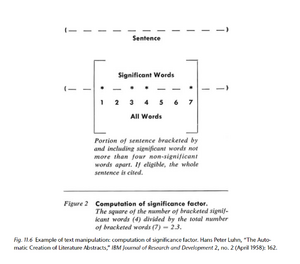User:Ssstephen/Reading/An Archive of Words
This reminds me of Vuk Cosic's File Extinguisher (which seems to be most easily accessed through the Internet Archive's Wayback Machine ironically). The File Extinguisher used to also have a map which unfortunately doesn't seem to be archived. The map as an archive is an interesting document as it primarily locates things in relation to eachother. Where do you put something in the archive, what is beside it, what is it far away from?
It will be the foundation for the history of the epistemol-ogy of our contemporary era.
How does "the epistimology of our contemporary era" have a history? I can only understand this as part of a more general history of epistemology, maybe I'm missing the point.
Thomas Aquinas in Roberto Busa Mallet topic modeling software, can this be used to make a Zipfian distribution? Try on John Dee's Liber Loagaeth for example or some of Hildegard's Lingua Ignota
a feeling of and, a feeling of if, a feeling of but, and a feeling of by
the a the a the the the the a the the a a the a a the the a a the a the a a a the the a a the the the the a a a a a the a the a the the a the the the the the a a the a a a a a the a a a the a a the the the a a the a a a the the a a a a a a a the a the a the the the a a a the a a the a a the a a the a a a a a a a a a the a the a a the a a the the the a a a a a a a a the the the a a a the a the a the a the the a a the a a a a the a a a a a a a a the a the a a the a the the the the the a a the a the a a the the a a a a a the the a a the a the the the the the the the a the a a the a a a the the a a a the a the a the the the a a the the the a the a a the a the a a the the the a a the a the a a a a a a a the a a a the the a the a the a the the a a the a a the a the a the the the the a a the the the a the a a a a a a the a the a a a a the a the the the the a the a the a the a the a the a the a the a the a the a the a the a the the the the the a a a the a the a the a the the the a the a a the a the a the the the a the a a the a the the the a a a the the the the a a a a the the the the a the a a a a a a the the a a a a a the the the the a a the a the a the the
the Microfiche Concordance to Old English: The High- Frequency Words.11 This marks a no-table development in the history of computer- generated concordances
No-table lol.
Ability of Google Search et al to understand or interpret natural language is super interesting. A search algorithm doesn't have the same logic of interpretation as a human, it finds meaning in other places and finds other meanings. Presumably corporate aims are to make this logic emulate human meaninging as much as possible to make it an efficient tool, but it's interesting to think about the alternative knowledge a meaning-making machine could find.
Concordance of indeclinables, John of Segovia
It was a forest of words
Strongs Concordance and other concordances of the Bible are aggregated here. A concordance is an external text which creates links within it's target text. This site as an aggregated concordance then creates links between the entries of different concordances, referring to the same target text.
Further reading
Paul Tasman, “Literary Data Processing,” IBM Journal of Research and Development 1, no. 3 1957
Franco Moretti, Distant Reading;
Steven Best and Sharon Marcus, “Surface Reading: An Introduction,” Representations 108, no. 1 (November 1, 2009): 1– 21;
Heather Love, “Close but Not Deep: Literary Ethics and the Descriptive Turn,” New Literary History 41, no. 2 (Spring 2010): 371– 91;
New Ways of Reading
Lev Manovich, “The Database as Symbolic Form,” Convergence5, no. 2 (June 1999): 80– 99;
Geoffrey C. Bowker, Memory Practices in the Sciences (Cam-bridge, MA: MIT Press, 2005)
An Universal History from the Earliest Account of Time to the Present
Barbara Flood, Historical note: The start of a stop list at biological abstracts
Biological Abstracts’ Subject in Context (BASIC) 1961 BASIC (Beginners' All-purpose Symbolic Instruction Code) 1964
The Internet may feel like a universal archive. In fact, it is more like a textual archipelago.

